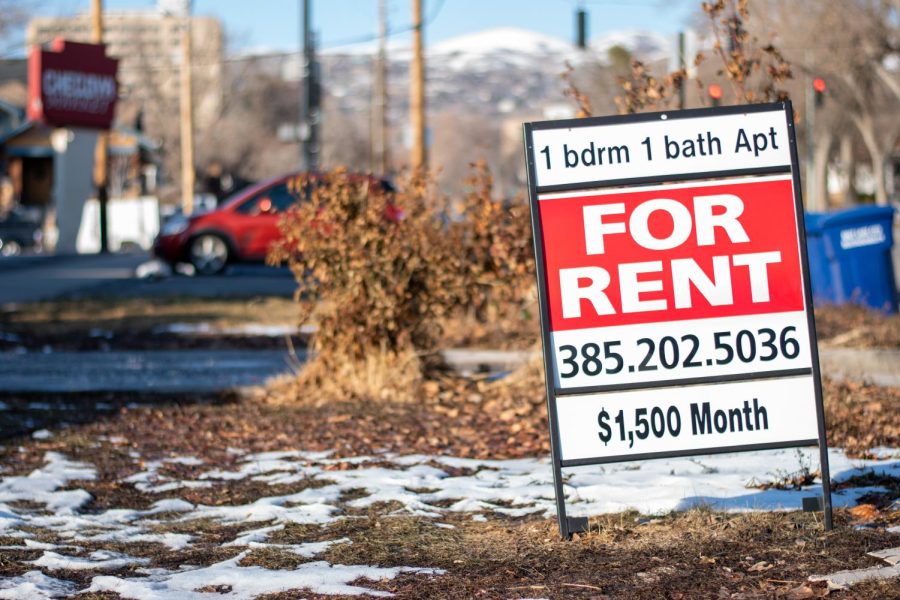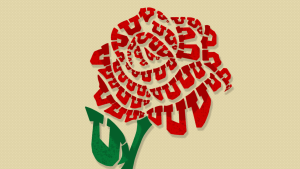Langley: Low-Income Housing Bill Helps Those Without a Home
A for rent sign on display outside of an apartment in the East Central Neighborhood of Salt Lake City on Tuesday, Feb. 7, 2023. (Photo by Jack Gambassi | The Daily Utah Chronicle)
February 10, 2023
In Utah, housing has become a severe issue for thousands of citizens. With housing prices rising by an absurd 24.6% during the pandemic, many now experience homelessness statewide. Thankfully, with recent subsidized developments and the potential adoption of H.B. 231 sponsored by Rep. Steve Eliason, which grants tax incentives for low-income housing units, housing may become more affordable.
While Utah still has a long way to go, policies like H.B. 231 help Utahns realize the need for the decommodification of housing.
The Need for H.B. 231 and Its Function
While housing experts estimate prices to fall, Utahns may still face comparatively high prices. Alongside record-breaking rent hikes and slowing housing construction, Utah’s housing market is in a rough situation. Consequently, homelessness rates, which also worsened due to the pandemic, have increased by around 25% from 2018 to 2022. Utah has taken great strides in constructing affordable housing with non-profits across the Salt Lake metropolitan area, and Eliason’s bill works to enhance this work. In H.B. 231, an amendment to Section 59-2-1101 helps the performance of these developments by exempting non-profit housing entities from paying property taxes on deeply affordable units.
Becoming a non-profit housing entity also becomes a more straightforward process with the implementation of this bill. Eliason’s bill slightly bends the legal definition of a non-profit to fit those who provide or are willing to provide permanent supportive housing for at least 15 years. It also provides this tax benefit for those who jointly own a property with a non-profit entity.
The Potential Benefits of H.B. 231
While the specific changes that H.B. 231 introduces to Utah law may seem niche, opening more doors to a non-profit-centered housing system can have many benefits. This is especially true when systems like these are catered to those who are experiencing homelessness or are elderly.
The lack of affordable housing in America is detrimental not only to individuals, but to the entire economy. So, the notion that affordable housing systems are “… indeed [hostile] to free market capitalism writ large,” as put by the American Conservative, is generally false. Not only is it wrong, but this line of thinking ignores that many Western, free-market countries have socialized housing programs — some of which are exceedingly robust and decades in the making. If the result of American-style, capitalist housing is that we have 33 empty properties for every person experiencing homelessness, it may be wise for some to reconsider their devotion to it.
Access to affordable housing also benefits the physical, mental and social health of citizens of all ages. Children who have experienced homelessness are far more likely to experience mental health problems and developmental delays than those in stable housing situations.
Additionally, in the United States, around 700 people die of hypothermia due to a lack of affordable housing every winter. However, those who find shelter in the colder months are not wholly safe due to the increased likelihood of catching illnesses like COVID-19 and influenza.
However, those experiencing homelessness are not the only ones benefiting. Victims of abuse are also more likely to escape their abusers when they have access to affordable housing. In a state where domestic violence is quite common, H.B. 231 can help give those experiencing abuse a fresh start.
How This Bill Will Help Students
Increasing housing prices have too spread to the University of Utah. Many students, in some cases, have their rent increased by over $750 in the last year. These prices make living financially straining, especially for graduate students or students with dependents. Off-campus prices for apartments in downtown Salt Lake can be around $2,000. According to the Salt Lake Tribune’s piece, for some students like Fagundo Ojeda, 60% of their income can go to rent. For context, this percentage would be considered well above what the United States government considers extremely rent burdened. Twenty percent of undergraduate students in America today have found themselves without stable housing. Consequently, the vast majority of these struggling students consider dropping out due to their financial situation.
With the rapidly increasing population at the U, many students stand to benefit from the adoption of H.B. 231, as the economic incentive will drive the creation of more low-income housing. Students on the brink of financial collapse due to high rents may also be able to find refuge in new housing, helping them complete their education.
Although Utah now suffers from an inadequate housing structure and volatility in the market, bills like H.B. 231 can help establish a more equitable and functional system. It may take time, but no price is too high when it comes to providing citizens — young and old — with the security of a safe, stable home.













